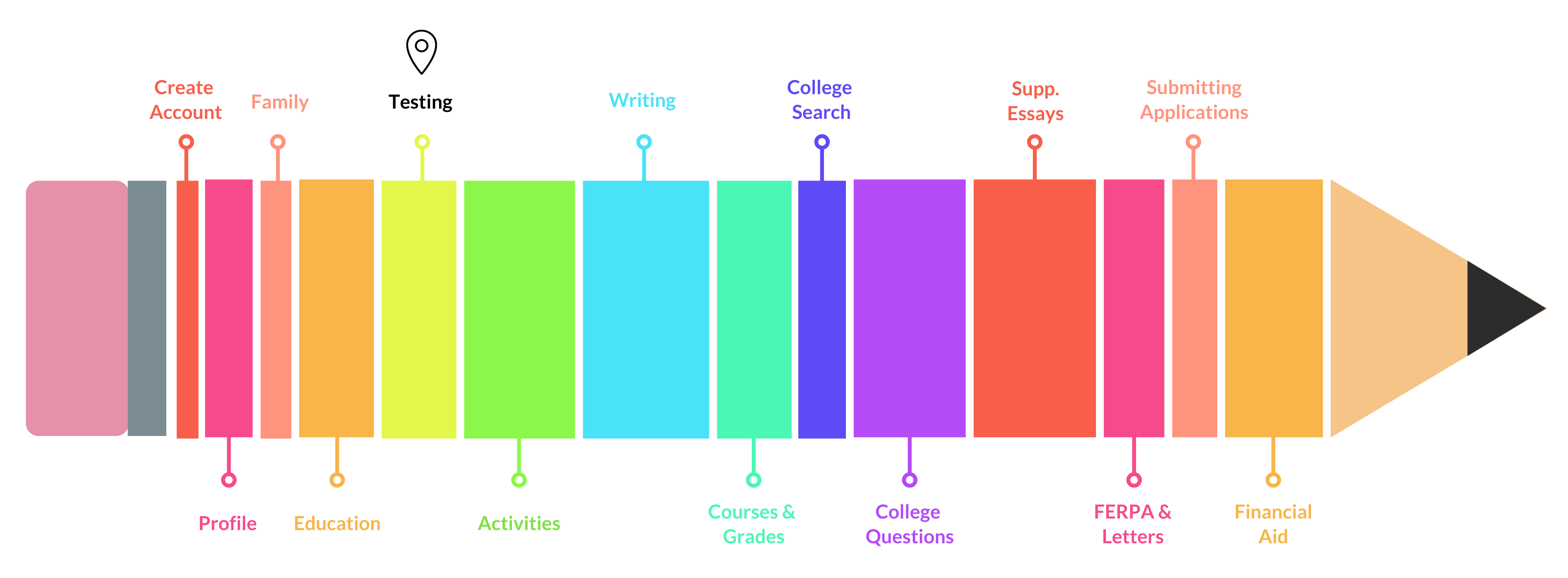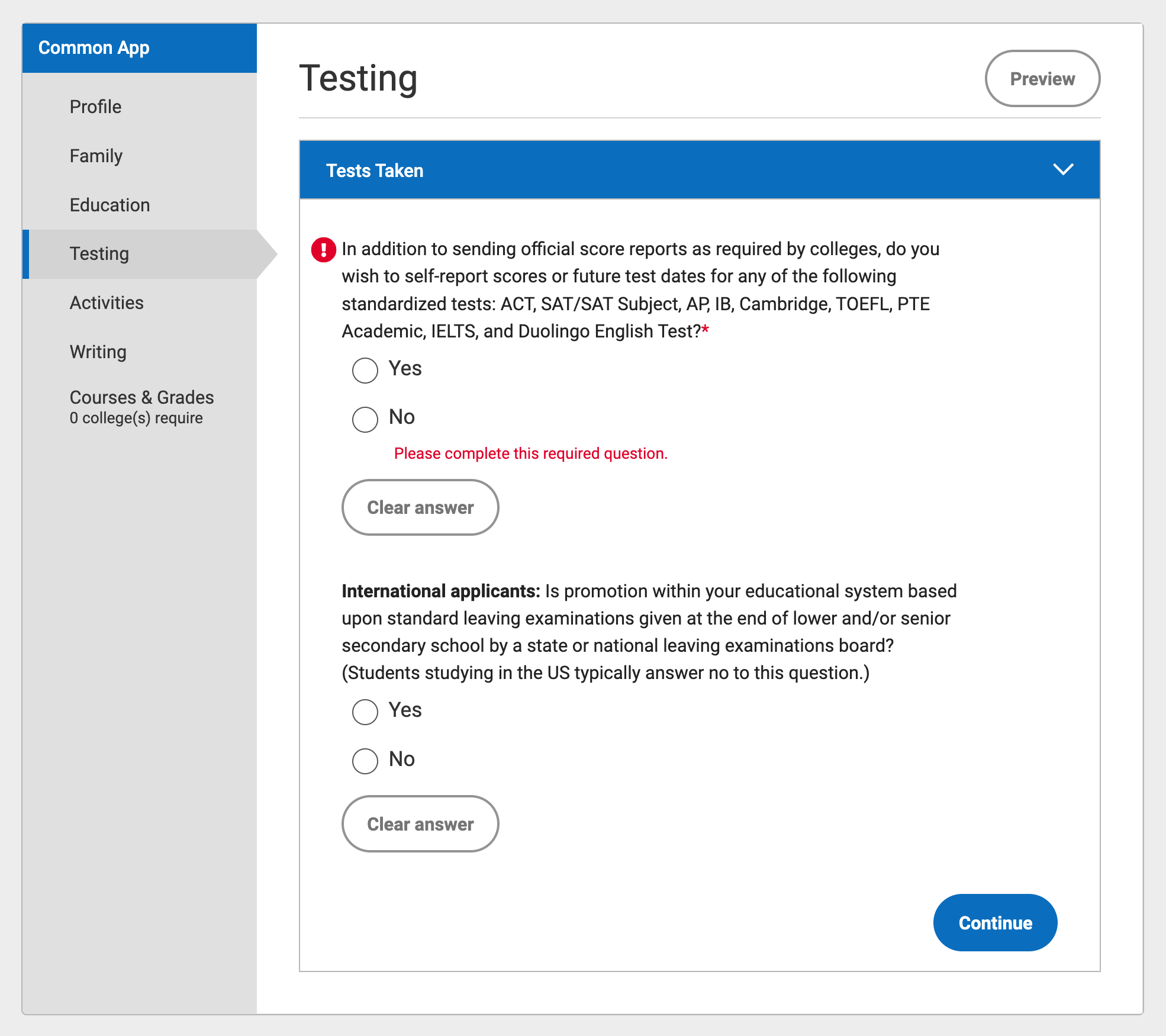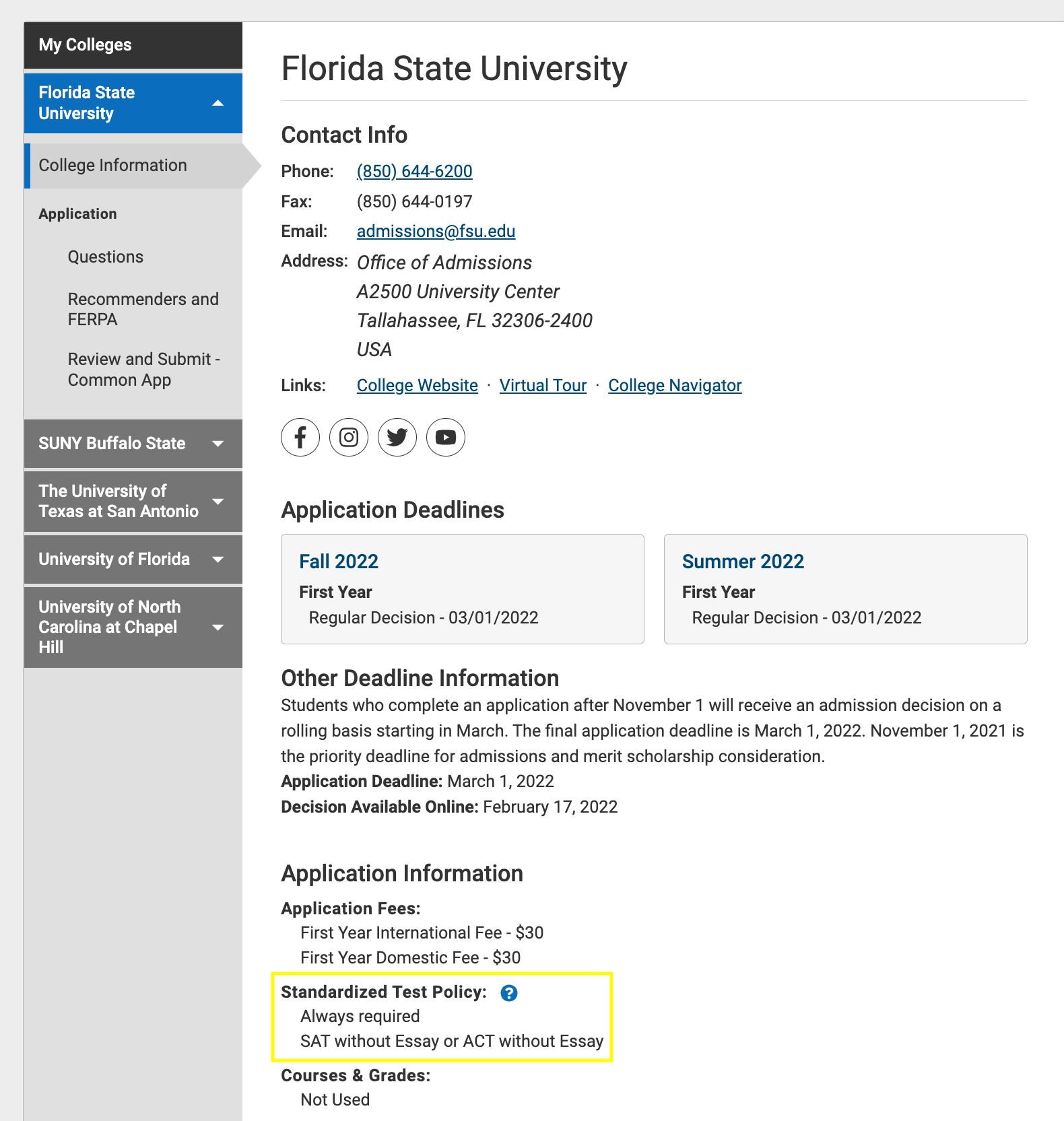Testing

This process should take approximately 10 – 20 minutes to complete.
Items marked with a red asterisk * are required. Students are not required to complete items that do not have the red asterisk.
Introduction
In this section, you will complete the Testing section of your Common App account. Each college has one of several common types of standardized testing policies. These include test-optional, test-blind, and test-flexible reporting requirements. In this section, we explain these different policies. You will learn about the following topics:
- Understand the concepts of test-optional, test-blind, and test-flexible
- Learn how to determine a college’s standardized testing requirements
- Understand the concepts of score choice and superscoring
- Learn how to report SAT, ACT, and other standardized test scores to colleges
Preview
This is an example of the Testing section in Common App.

Videos
In this video, we discuss the most common standardized testing requirements found at most colleges, including test-optional, test-flexible, and test-blind policies. We also discuss how to learn about a specific college’s testing policy. This video is 4 minutes in length.
In this video, we discuss how to report test scores to colleges. We also discuss other types of standardized tests, including AP tests and the IB Diploma. The purpose of this section is for you to understand how to share your test scores with colleges. This section should take 2 – 20 minutes to complete.
In this video, we discuss Common App questions about standardized tests that are specific only to international students. This section should take 5 minutes to complete.
Tips & Reminders
- Usually when colleges and people talk about “test scores,” they are referring to the SAT or the ACT. Some colleges require students to take one of these tests and report their scores in order to apply. Some colleges do not require test scores as part of their admissions process. This second group of colleges are called test optional and it is your choice to send or not send scores. A third group of colleges is test-blind. This means that they will not review test scores when making the admission decision, even if the scores are sent to the college.
- If you plan to take a future test but are unsure of the date, you can add the future test date or dates up until the time that you submit your application. You can also have test scores sent directly from the testing agency to the college admission office.
- A college’s website will describe their testing policy. Go to the Admission page of the college website and look for information about application requirements.
- You can also find a link to the college’s testing policy under Common App’s My Colleges tab if you have put the college on your list. Choose the college name on the left and then scroll down on the page to find information about the college’s standardized testing policy and a link to its website.
- Another good source for information about testing policies is FairTest.
- If a college is test-optional, we recommend that you talk to your school counselor to decide whether or not to submit your scores to that specific college. You have the option of choosing to submit scores to only some of your colleges.
- Some colleges allow students to “self-report” their scores by reporting them in Common App. Read the college’s testing policy carefully to understand its testing policy. Often, self-reporting means entering test scores in Common App.
- Other colleges require students to send “official” scores. To send official scores, you must contact the testing agency, which is either the College Board for the SAT, or the ACT, and order the reports. There is a fee to order official scores but you may qualify for a fee waiver. Your school counselor should have information about the fee waiver.
- If there are additional questions, Common App Solutions Center has information for applicants, counselors, and recommenders.
Recently, a growing number of colleges and universities have allowed students to choose whether or not to report SAT or ACT scores in their applications. These institutions are called “test-optional” and for these schools, it is the student’s choice whether or not to take the SAT or ACT and whether or not to report scores that were received.
A small but increasing number of colleges and universities have adopted “test-blind” or “test-free” policies, which means the college or university will not consider test scores at all in their application review (even if scores are reported).
Some colleges allow students to report scores from alternative tests to the SAT/ACT, including Advanced Placement (AP) tests or International Baccalaureate (IB) tests. Students should review each college’s website for details about its testing policy.
When Common App or universities or colleges refer to “standardized tests,” they are most commonly referring to the ACT and the SAT. When colleges or universities are called test-optional, test-flexible, or test-blind, these terms refer to whether applicants are required to submit either an SAT or ACT score as part of their application. Please review the testing requirements at each college and university on your list. There are additional tests that include AP Exams, IB Exams, TOEFL, and others. These test scores may be reported on Common App.
Score choice is a policy where the student who has taken the standardized test more than once may decide which test date to send to their colleges. For example, if the student took the SAT twice, they could choose to send only their best score. Although many colleges/universities accept score choice, they may still recommend that students send all of their test scores. Each college might have different policies for what scores a student should send as part of their application. The college’s website will explain its testing policy and what scores students need to submit. Students can also ask their school counselor for advice if they have questions. Students can choose to submit scores to some colleges and not to others.
Some colleges and universities have a “superscoring” policy. This allows students who have taken the test more than once to pick the highest individual score for each subject and combine them into one super score. For example, a student who took the SAT twice could choose to send the Math score from the first sitting and the English Based Reading and Writing score from the second sitting. Another variation is that some colleges will only look at a student’s highest score from a single sitting.
The SAT is an exam administered by the College Board and used by many colleges and universities to make admission decisions. Most colleges that accept standardized tests accept the SAT or the ACT interchangeably.
The ACT is an entrance exam administered by ACT and used by many colleges and universities to make admission decisions. Most colleges that accept standardized tests accept the SAT or the ACT interchangeably.
Some high schools offer AP, or Advanced Placement, courses. These are college-level courses in a variety of subjects. AP exams, typically offered in May, test student learning in AP classes. Students may take AP courses without taking the exams. Students may also take AP exams without taking the courses. If students do take AP Exams, they may report their scores on Common App, but they are not required to do so unless the college states that they must report it. If a student is accepted at a university and chooses to attend, they might be asked to send official scores to verify what they reported in their application or to gain college credit for their scores.
Some colleges allow students to “self-report” their test scores and other colleges require “official” scores. “Self-reporting” means that the student may enter their scores into Common App and they are considered reported. If a college requires that students submit “official” scores, the student must contact the testing agency, which is either the College Board (SAT) or the ACT, and request that scores be sent to each college that requires them. There is a fee to send official scores, but qualifying students can get a fee waiver from College Board or ACT if they meet certain criteria.





